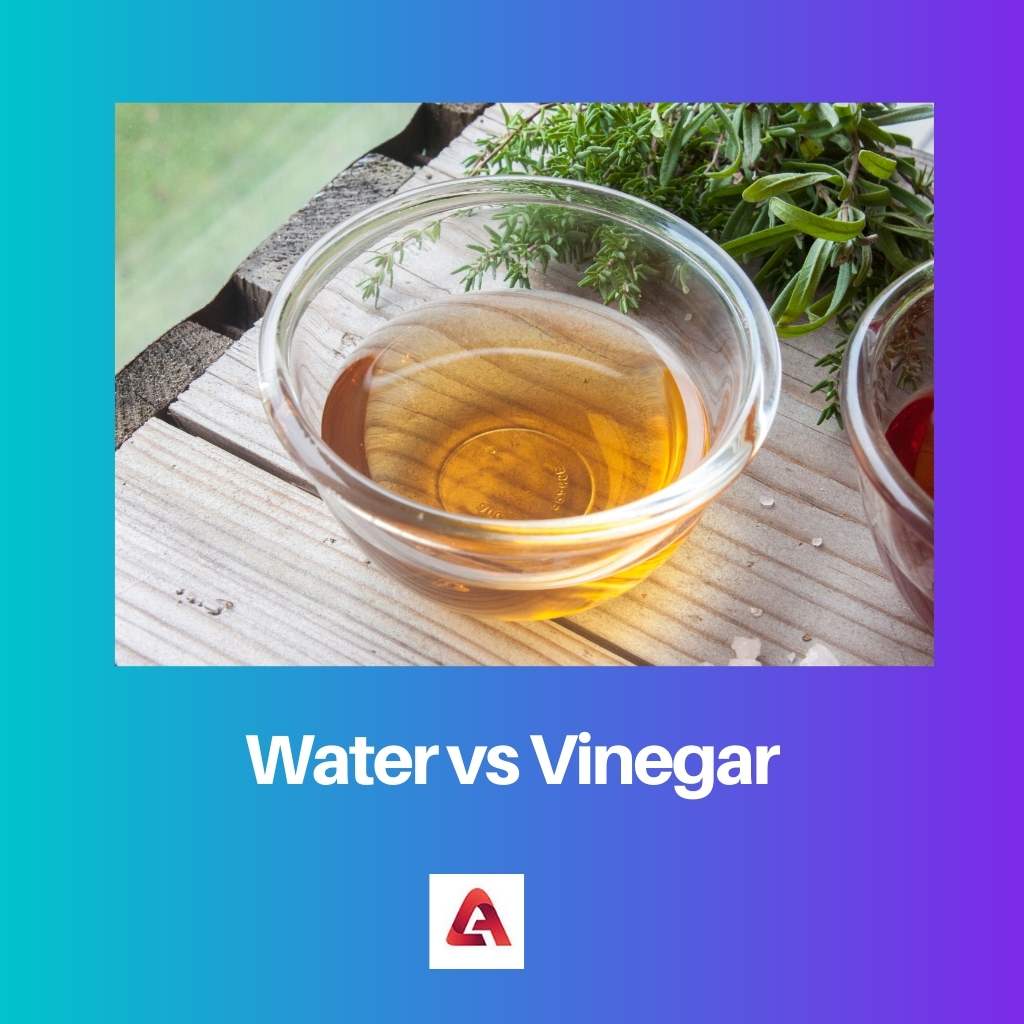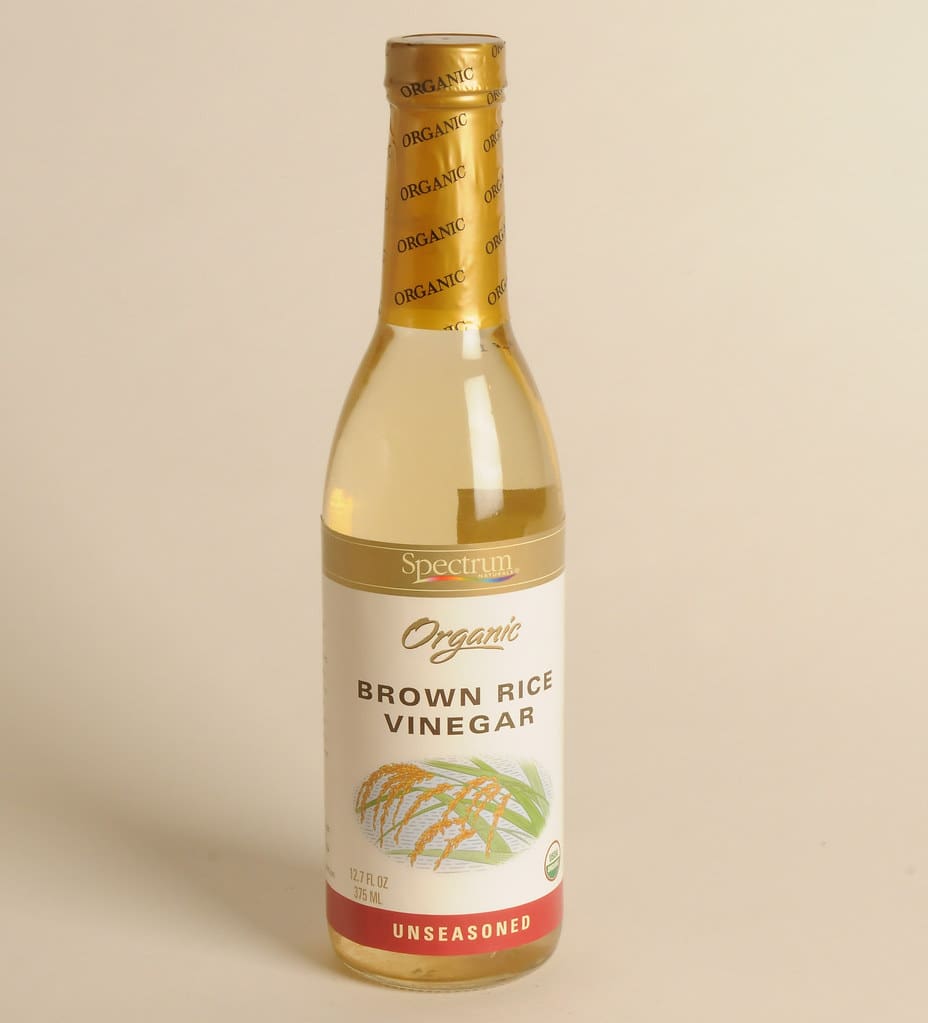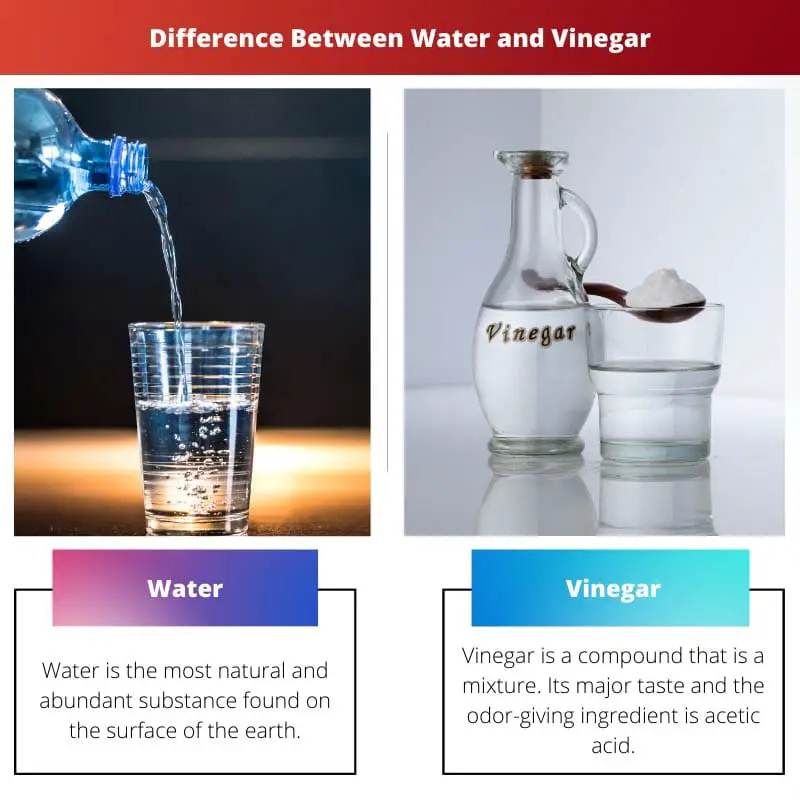Water and vinegar are two substances that are found naturally in nature. But their natural presence is not the only way humans can use or consume them.
Humans have found ways to create this naturally existing substance in laboratories, thereby helping mankind with the lack of such substances artificially.
Key Takeaways
- Water is a tasteless, odorless liquid essential for life, while vinegar is a sour liquid made by fermenting ethanol.
- Vinegar has acetic acid, giving it antimicrobial properties that make it a popular cleaning agent and food preservative.
- Water and vinegar are versatile but have different uses and properties due to their distinct chemical compositions.
Water vs Vinegar
The difference between water and vinegar is that while water is a simple chemical molecule in both its structure and formula, vinegar has been incorporated with the addition of acetic acid, thereby creating a semi-fermented solution of alcohol. This structure is complicated and greatly differs in vinegar’s physical and chemical properties.

Water is the most natural and abundant substance found on the surface of the earth. It has been a necessity for humanity and for the continued existence of all beings, including plants and animals on earth.
Without water, persistent drought and famine would begin creating issues within communities and fights in the name of water.
Vinegar is a compound that is a mixture. It is a major taste and the odour-giving ingredient is acetic acid which is also a naturally found substance in fruits such as apples, pineapples, grapes, strawberries, etc.
It is extracted from such fruits to create different variations of vinegar, like apple cider vinegar. There are other kinds of vinegar created, like white vinegar and balsamic vinegar, that have been added flavours from fruits or other acetic acid sources.
Comparison Table
| Parameters of Comparison | Water | Vinegar |
|---|---|---|
| Ph | Neutral and at 7 | Acidic and is between 2-3.5 |
| Percentage Presence in Nature | Very high | Less in comparison |
| Does the Freezing Point Depend on Percentage of Composition of Elements in Each? | No | Yes, on the percentage presence of acetic acid |
| Taste | Tasteless | Sour and tangy |
| Surface Tension | One of the highest in liquids | Low in comparison |
What is Water?
Water is an inevitable element that helps in the continuous existence of the world.
Water covers over 2/3rd of the earth’s surface, making it the dominant element among the four elements of the earth.
It is tasteless and also odourless. These features are attributed to a water molecule structure’s physical and chemical nature.
The structure of a water molecule consists of two hydrogen molecules and a single oxygen molecule.
The shape formed by the combination of the three molecules is called a bent shape, with oxygen in the centre with a certain angle between the two hydrogens and the oxygen.
When the water in its liquid form is frozen to solid, the volume occupied by the water molecules increases.
That is, water in its solid form needs more volume than in its liquid form while considering the same quantity at a single time.
Water is one of the few liquids with great density. Freshwater has one of the greatest densities at -4°C temperature.
Water is a conductor of heat and electricity, making it both a boon and a bane simultaneously.
It is called the universal solvent, given that most solutes can dissolve themselves in water till the saturation point.
Just as it has a high density, its surface tension is also greater than most liquids that are commonly in use.
There is a temperature at which it can exist in all three states at once. This is called the triple point of water.
The triple point of water is 273 K or 0.01°C.

What is Vinegar?
Vinegar is an acidic compound that is a mixture of a small amount of alcohol and acid.
It is highly versatile and has many additional ingredients to form the final product of vinegar.
The most popular method of preparing vinegar is by fermentation of alcohol. The alcohol that is preferred for fermentation is ethanol.
The acid part of vinegar is always the same. It is always acetic acid.
The acetic acid gives vinegar an acidic pH of about 2-3.5. This gives many property changes to the vinegar at varying gradients and concentrations.
Vinegar is sour and slightly tangy in taste. It has a strong odour that can become a stench to some people that flare their nostrils.
A single vinegar molecule has two carbon molecules, two oxygen molecules, and four hydrogen atoms.
The freezing point of vinegar depends on the concentration of acetic acid.
The standard concentration of acetic acid content in vinegar is 5%, with a freezing point of -2°C.
Vinegar has a lower capability to conduct heat and electricity. Vinegar tends to be cold for the most part.
It has a lower surface tension when compared to most liquids. And vinegar naturally exists in the liquid state and has no other form unless compelled by humans.
The difference in the bottles of vinegar depends on the nature of the liquid used for fermenting.
White vinegar is a classic oxidized form of distilled alcohol. This alcohol is ethanol in most cases.
Apple cider vinegar is fermented with apple crush, while balsamic vinegar is made with fermenting grape crush.

Main Differences Between Water and Vinegar
- Water is tasteless and odourless, making it difficult to differentiate it from other similar liquids, whereas vinegar has a sour punch and a strong smell.
- While vinegar has an acidic pH of 2-3.5, water is medium neutral, and plain freshwater has a pH of 7.
- Water has a freezing point of 0°C, which can vary at times due to freshwater or saltwater but the freezing point of vinegar changes with the concentration of acetic acid in it.
- While water has great surface tension, vinegar has very low surface tension.
- Water is the only substance to exist in all three forms, solid, liquid and gas, while vinegar exists in liquid form alone.

- https://science.sciencemag.org/content/209/4455/451.abstract
- https://onlinelibrary.wiley.com/doi/abs/10.1111/1750-3841.12434

This article is so insightful, I never knew vinegar is made from the fermentation of ethanol or apple crush. Vinegar is truly interesting. Thanks for sharing!
I’m not sure if vinegar’s freezing point was addressed correctly in this article but the rest of this is quite informative.
Yes, I learned a lot about vinegar too. The article is well-researched.
The descriptions of water and vinegar were a bit too basic. Could have used more complex molecular and chemical concepts to make it more intellectual and detailed.
The provided table was helpful. I never knew vinegar’s freezing point varied with the concentration of acetic acid. Great work!
Water and vinegar are indeed multifaceted! The article provided very informative and detailed differences between the two substances. I wish they would have considered more thoughts on environmental usage of these substances. This is a great read!
The article is misleading at times, and the information seems incorrect. Surely, vinegar isn’t the only substance that has its freezing point depend on the percentage of composition of elements in it. Great article except for that misleading information.
I agree. Water’s freezing point depends on the presence of impurities in it. I found that part inaccurate as well.
This article was comprehensive and a bit basic, I expected more in-depth facts about water and vinegar. It seems more like a general overview than an in depth scientific look.